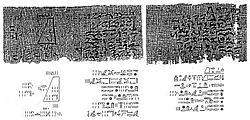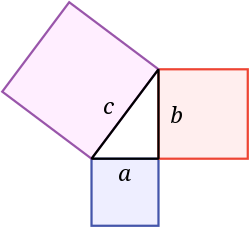History of mathematics
The history of mathematics is how mathematics has developed over time.
Early history
Early maths by Babylonians and Egyptians was built upon by Greeks such as Euclid, Archimedes, Pythagoras and Eratosthenes. Other important people are people such as Fibonacci, Descartes, Leonhard Euler, Blaise Pascal and Gauss.
20th century
Women in mathematics
Problems
Many mathematical problems have been proposed and solved. Andrew Wiles became famous by proving the Fermat's Last Theorem.
World War II
Some mathematical works had relation with the war. British mathematician Alan Turing created the Enigma machine to uncode Nazi codes. On the other hand, several mathematicians like John von Neumann worked on the Manhattan Project.
History Of Mathematics Media
Geometry problem on a clay tablet belonging to a school for scribes; Susa, first half of the 2nd millennium BC
Image of Problem 14 from the Moscow Mathematical Papyrus. The problem includes a diagram indicating the dimensions of the truncated pyramid.
The Pythagorean theorem. The Pythagoreans are generally credited with the first proof of the theorem.
One of the oldest surviving fragments of Euclid's Elements, found at Oxyrhynchus and dated to circa AD 100. The diagram accompanies Book II, Proposition 5.
Archimedes used the method of exhaustion to approximate the value of pi.
Apollonius of Perga made significant advances in the study of conic sections.
Title page of the 1621 edition of Diophantus' Arithmetica, translated into Latin by Claude Gaspard Bachet de Méziriac.
The Hagia Sophia was designed by mathematicians Anthemius of Tralles and Isidore of Miletus.









